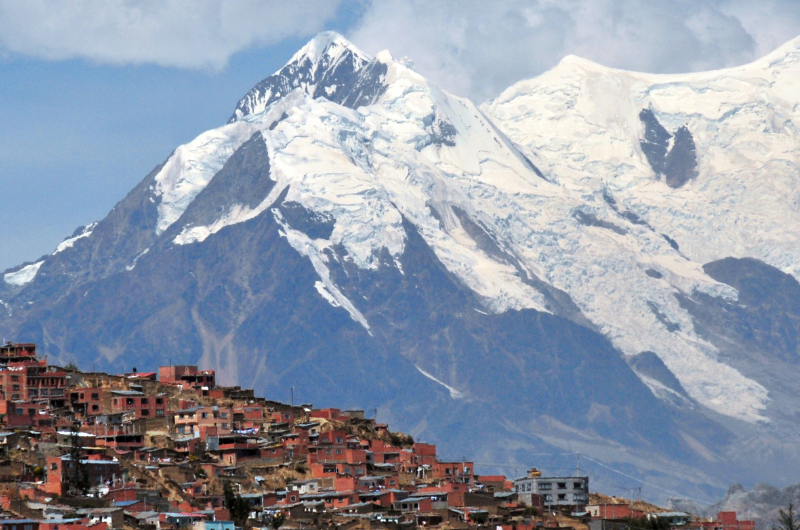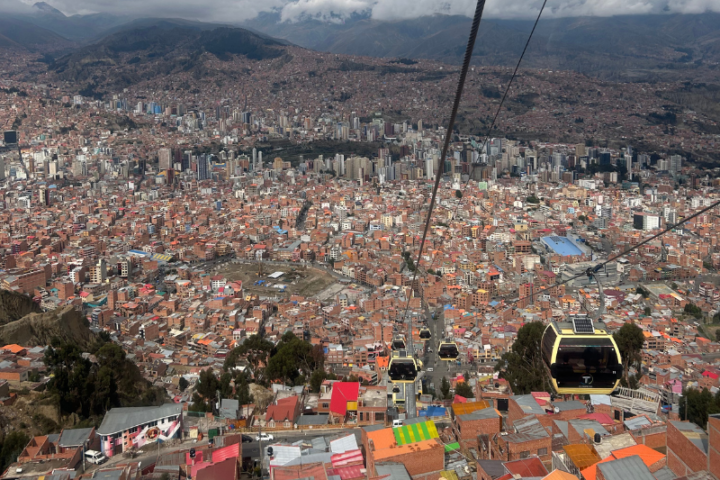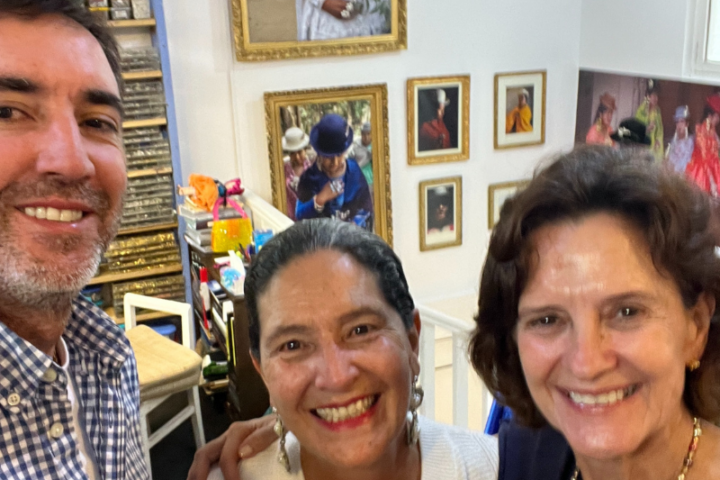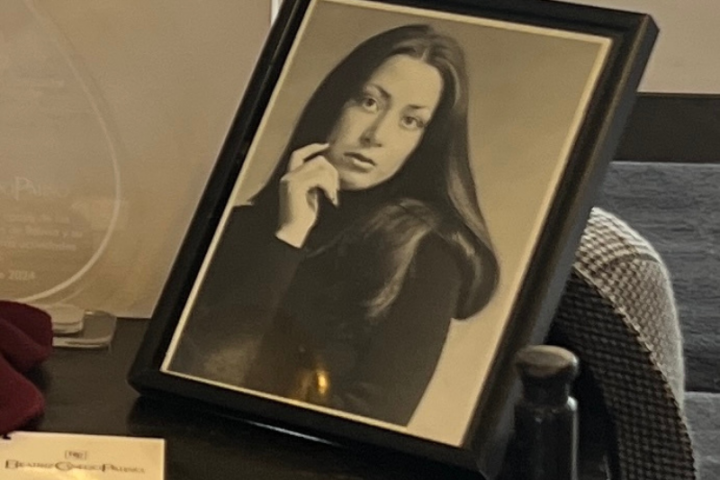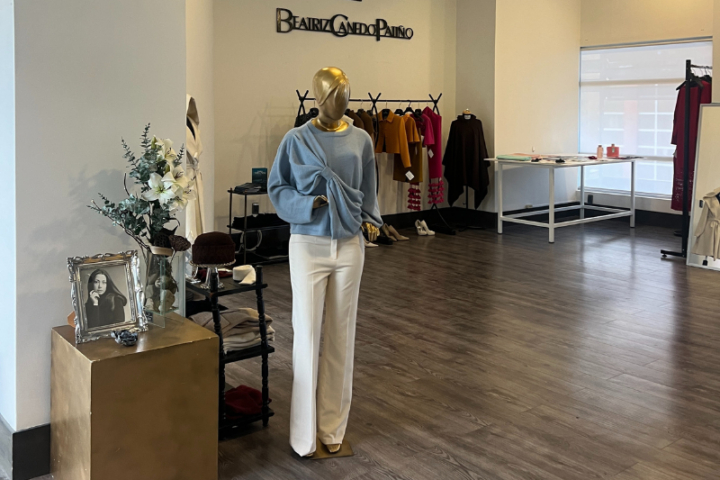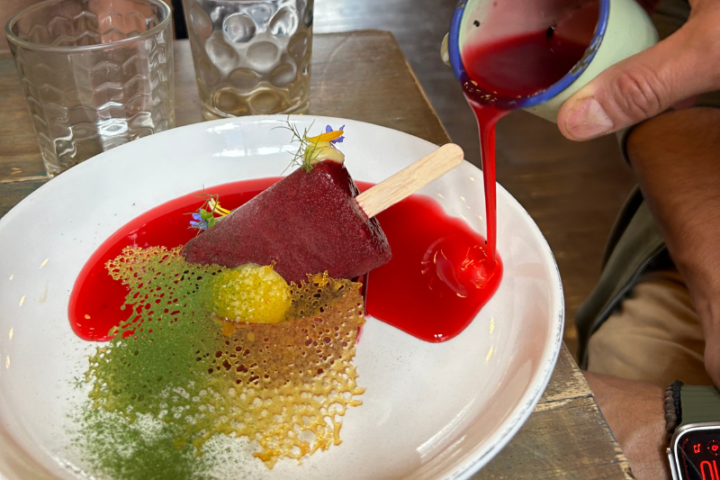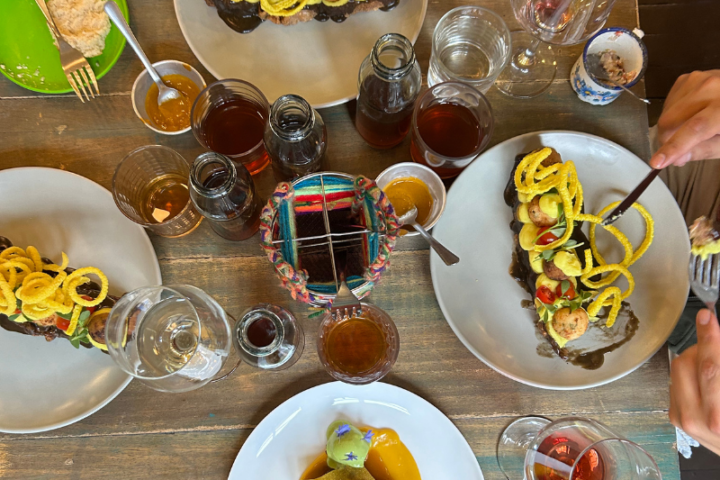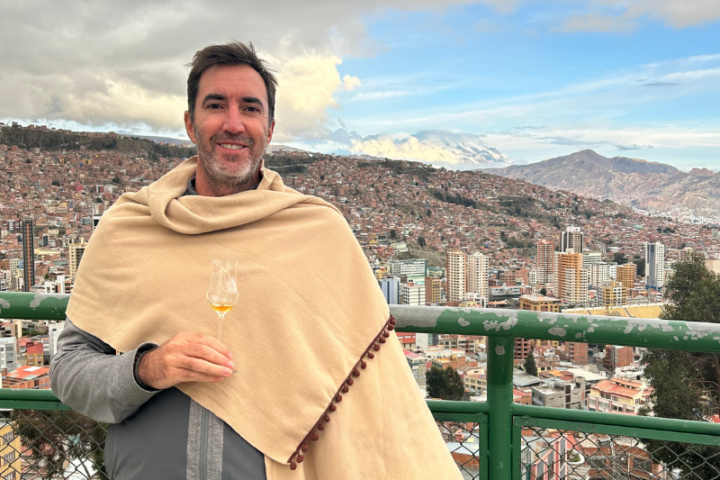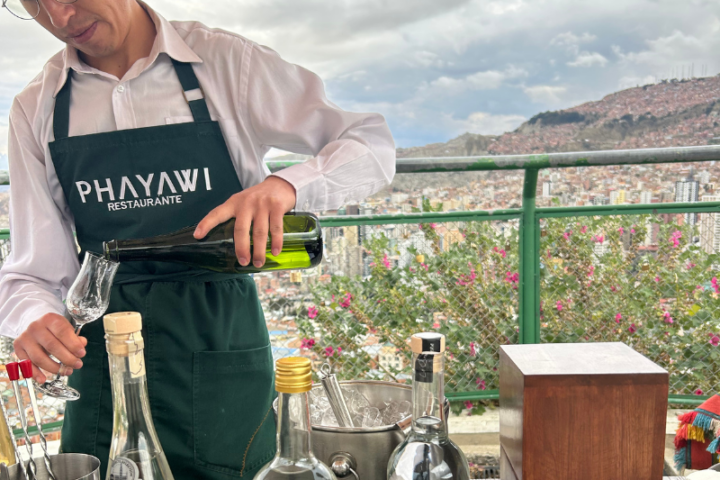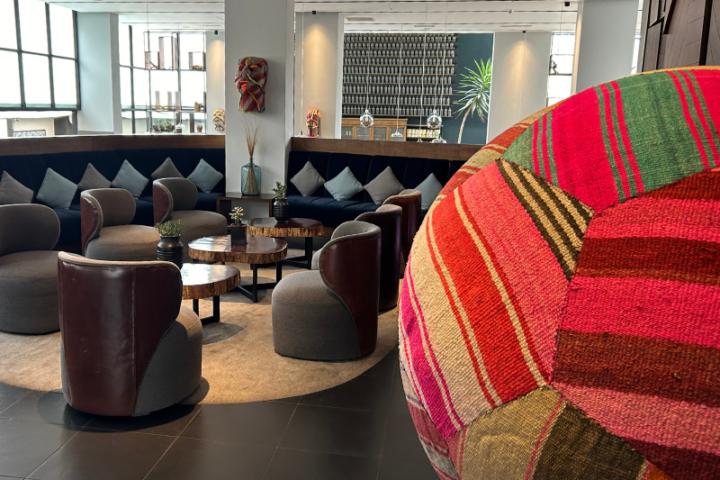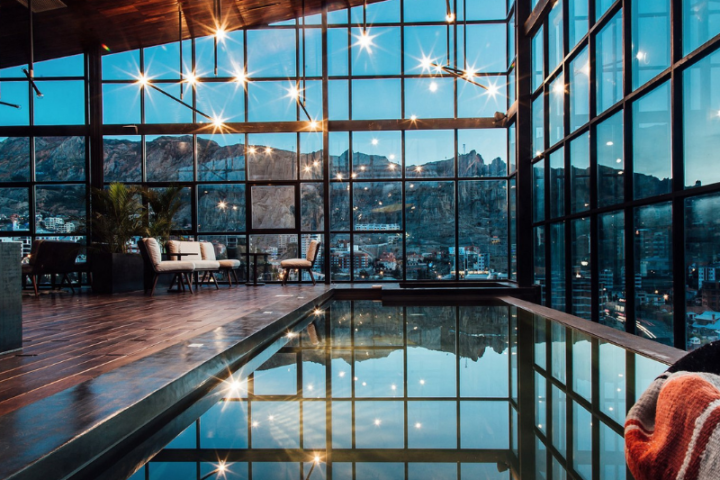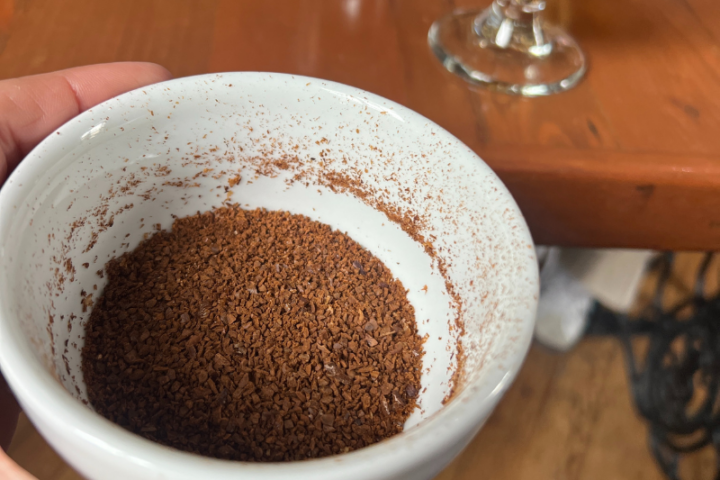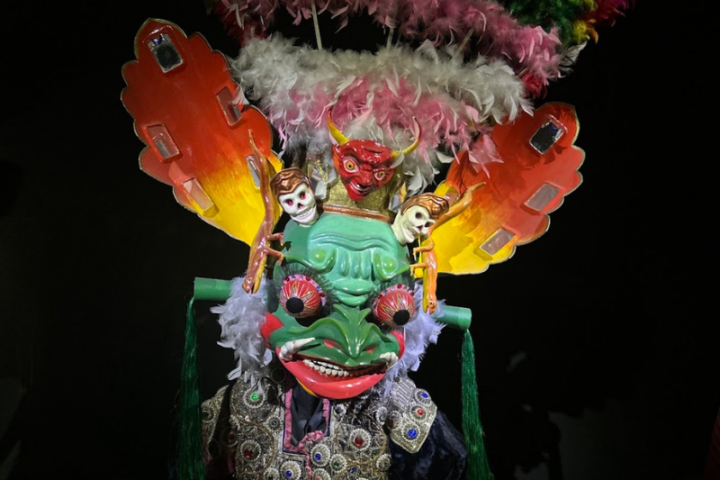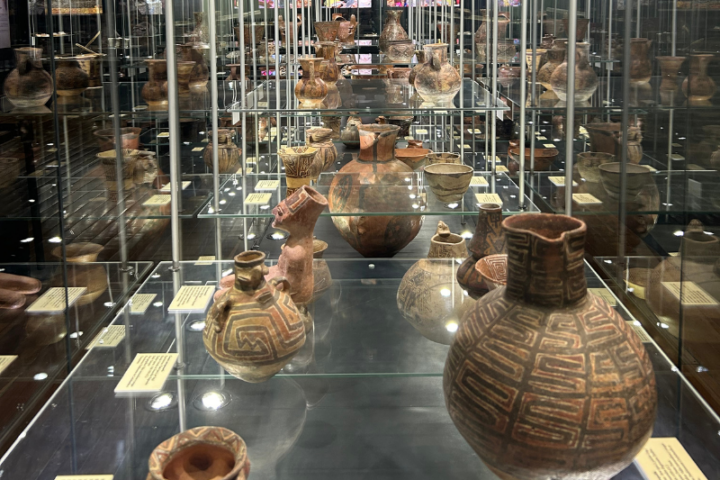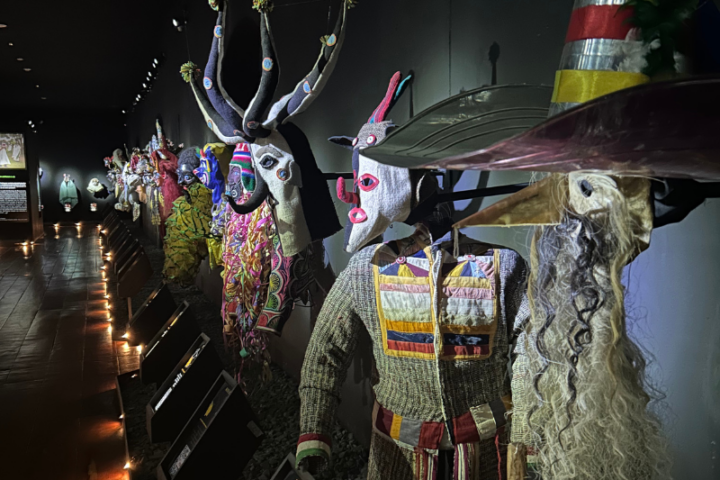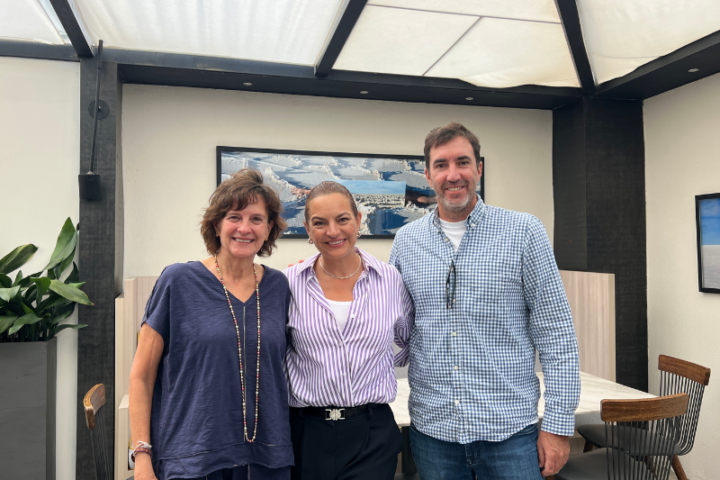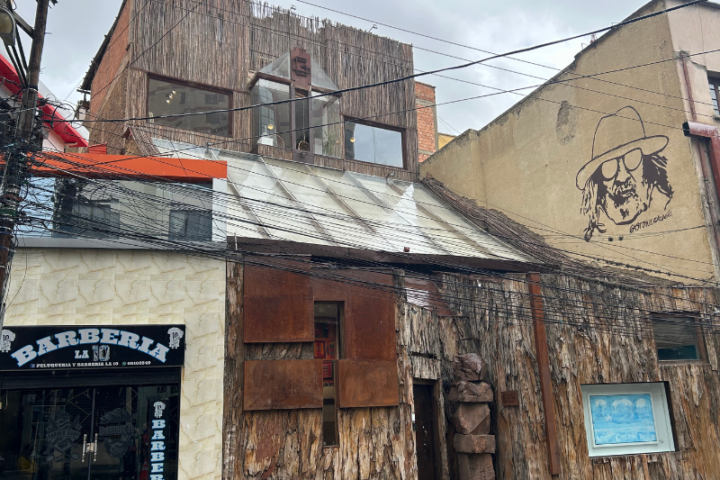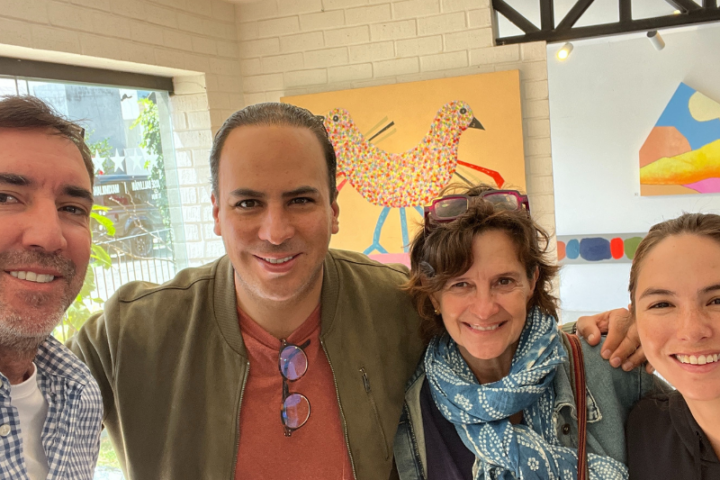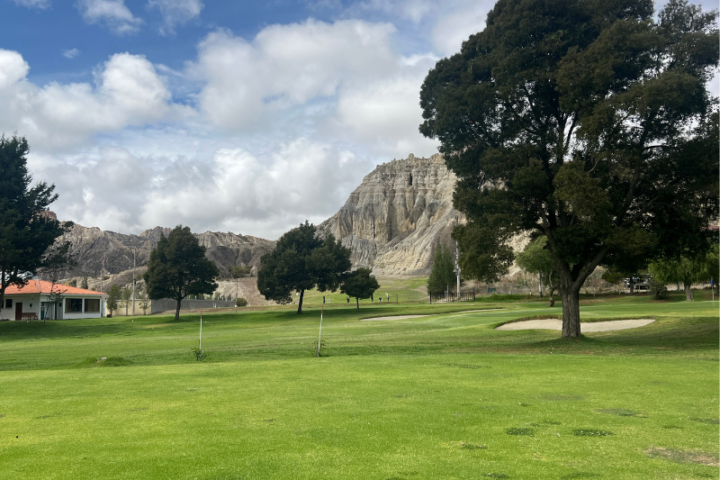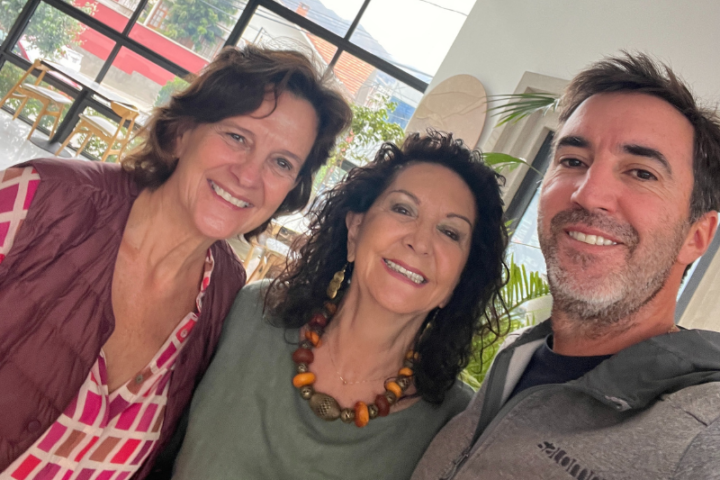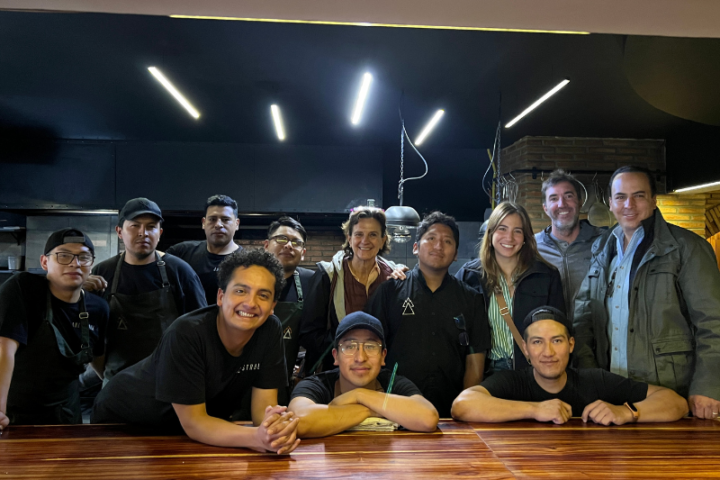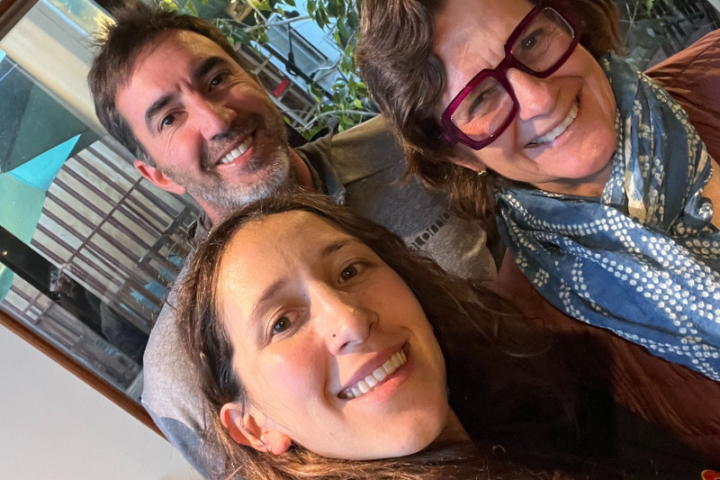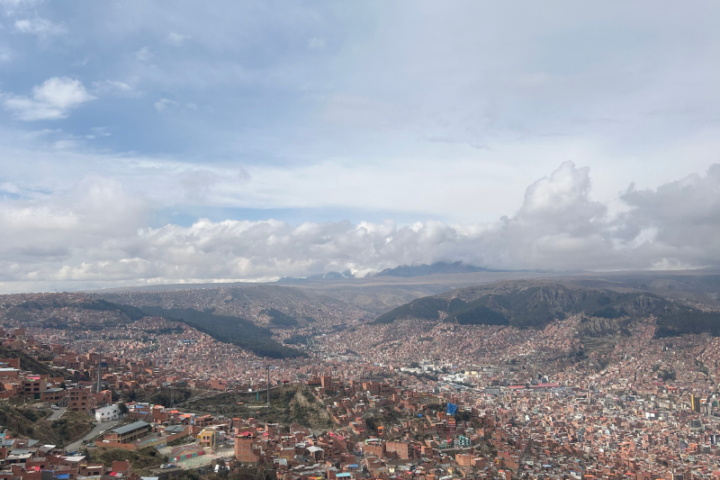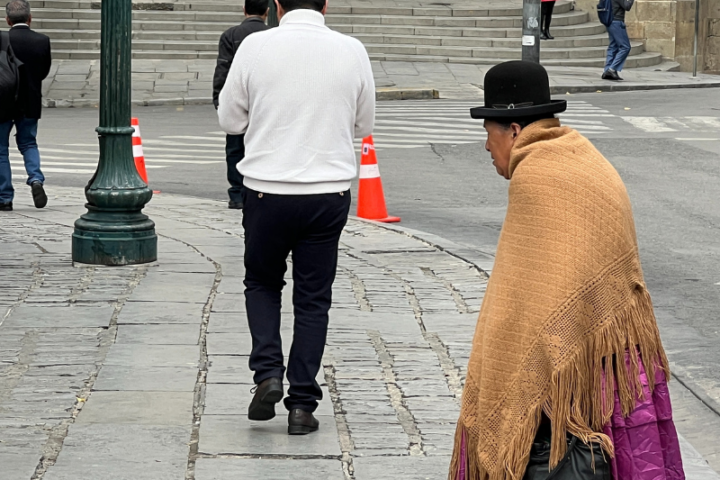There has always been something undeniably magnetic about La Paz—a city perched high in the Bolivian Andes. At 3,650 meters above sea level, the world’s highest capital defines its own kind of destination. There’s a tilting strangeness to it—traditional Andean dress side by side with the buzz of a 21st-century Latin American capital.
That contrast has always defined La Paz, a city we’ve explored for over thirty years. But as Marisol and Juanjo discovered on their recent trip, the city’s striking duality now feels more refined. It’s elevated and sophisticated, yet still grounded in its original soul.
Once known for its raw charm, La Paz has quietly emerged as a hub of culinary genius, cultural happenings, and boutique hospitality. It’s captured international attention too, recently recognized by Condé Nast Traveller as one of the best places to visit in 2025, in part due to its food scene. The city is alive with market traditions, avant-garde chefs, and a newfound culinary confidence that is redefining Bolivian gastronomy. When we first curated journeys here, it attracted the hardiest travelers, willing to brave the city’s dizzying altitude. But now, as Marisol puts it, the city has truly “come of age.”
Extraordinary People, Extraordinary Access
What makes La Paz truly exceptional isn’t just the extraordinary experiences—it’s the extraordinary people behind them. This 48-hour guide is more than just things to do. It’s about the brilliant spirits shaping the city from within. That’s the true value of Aracari: our insider network, offering access no AI ever could.
Incredible gallerists like the Ugalde family, who open their private collection to those in the know. Culinary visionaries like Marsia Taha, recently crowned Latin America’s Best Female Chef 2024. And, of course, Andrea and Dante—our newly-introduced friends in the city—well-traveled locals who already feel like old companions. Then there’s also Bolivian designer, Deanna Canedo, of the fashion house BCP (her gorgeous pieces feature on Aracari Shop), niece of the iconic Beatriz Canedo Patiño (BCP), whose haute couture once graced 1950s New York runways. Plus incredible art collector and friend of Aracari, Ximena Alvarez.
This is, and always will be, our superpower: people. Brilliant, passionate Bolivians who transform a destination into something personal. A behind-the-scenes showcase of the city’s authentic soul, without artifice. What a joy it is to know that everything you see is unfiltered and true.
This is La Paz, seen through the eyes and hearts of those who live and thrive here. From a private salteña tasting to a behind-the-scenes dinner at Ancestral—welcome to 48 Hours in La Paz: insider access to a city reimagined.
48 Hours in La Paz: The Ultimate Insider’s Itinerary
With the scene perfectly set, here’s how to spend 48 unforgettable hours in La Paz—a journey of exclusive encounters, exquisite flavors, and the city’s most captivating corners, revealed by those who know it best.
Day One: Altitude, Art, and Authentic Flavors
9:00 AM | Cable Car City Tour & El Alto’s Cholets
Start your first morning in La Paz with an elevated perspective. Board the Mi Teleférico, the city’s extraordinary cable car system, and glide above its bustling streets. It’s more than just transportation—it’s an aerial introduction to the city’s layered topography and vibrant neighborhoods. You’ll pass everything from the colonial heart of downtown to the sprawling expanse of El Alto.
Disembark in El Alto to explore the flamboyant Cholets, architectural wonders designed by Freddy Mamani. These bold, neo-Andean mansions are more than eye-catching—they’re a social statement and artistic expression, reflecting Bolivia’s indigenous resurgence and cultural pride.
11:00 AM | Historic Center Stroll, Concept Stores and Designer Workshops
Back at ground level, immerse yourself in the charm of La Paz’s historic core. Wander down Sagarnaga Street, lined with artisanal shops, before stopping at Mistura, a concept store celebrating contemporary Bolivian design. You’ll also drop into the workshop of Ana Palza who designs for the upscale “Cholitas” or traditionally dressed women. Nearby, the Witches’ Market offers a glimpse into Bolivia’s mystical traditions—dried herbs, amulets, and talismans, all said to bring fortune and protection.
A short drive away, visit the Bolivian fashion pioneer, Deanna Canedo, located at Casa Grande Hotel. This intimate experience allows you to explore her workshop, where her designs continue the legacy of her aunt, Beatriz Canedo Patiño (BCP). Known as the pioneer of sustainable luxury fashion, BCP revolutionized alpaca, llama, and vicuña textiles, crafting haute couture and ready-to-wear collections that embody understated elegance. Inspired by Bolivia’s beauty and vibrant colors, her designs remain a hallmark of sophistication and originality.
Deanna continues this vision, blending innovation with heritage, allowing visitors to experience the intricate artistry of Bolivian fashion. Beatriz Canedo Patiño pieces are proudly exhibited on the Aracari Shop, offering travelers an exclusive opportunity to take home a piece of Bolivian craftsmanship.
1:00 PM | Lunch at Popular
After a morning of exploration, indulge at Popular, a restaurant that reflects La Paz’s evolving culinary scene. Born from the legacy of Gustu—once the city’s sole internationally acclaimed dining spot—Popular is the creation of Gustu alumni, trained under its exacting standards. Gustu wasn’t just a restaurant. It was a movement, nurturing young Bolivian talent and inspiring them to reimagine the country’s rich larder.
For Marisol, this was the absolute highlight of her trip. “It was one of the best meals I’ve had in a long time,” she reflects. “Every dish felt like a celebration of Bolivia’s culinary evolution—rooted in tradition yet presented with such contemporary finesse.”
There are no reservations here—just an unpretentious atmosphere, where each plate tells a story of seasonality and place. A visit here is also an opportunity to discover Bolivian wines, still under the radar but gaining well-deserved recognition. Grown at some of the highest-altitude vineyards in the world, Bolivian wines have a striking depth of flavor, shaped by the unique climate of the Sucre and Tarija regions. Among the must-try labels is Don Cristian, a standout producer crafting elegant wines that reflect Bolivia’s distinctive terroir. Recently highlighted by The New York Times, Bolivia’s wine scene is one we’ve long admired—and a visit to La Paz is the perfect place to start uncovering its hidden gems.
4:00 PM | Killi Killi Lookout & Singani Tasting
After lunch, ascend to Killi Killi Lookout, one of La Paz’s most breathtaking vantage points. From here, the city sprawls across its deep bowl, with Illimani’s snow-capped peak towering in the distance. This silent guardian watches over the bustling streets below. The lookout’s name comes from a native bird, once common here, reflecting the sense of freedom you’ll feel standing above the city’s vibrant patchwork.
But the experience goes beyond the view. Here, enjoy a private Singani tasting—Bolivia’s national spirit, distilled from aromatic Muscat grapes grown at high altitude. Guided by an expert, you’ll sample unique expressions of this storied drink. Discover how Singani has been at the heart of Bolivian celebrations for centuries. As the sun sets and shadows stretch across the cityscape, each sip becomes a toast to La Paz itself.
5:00 PM | Check-In & Leisure Time at Atix Hotel
Return to Atix Hotel in Calacoto—a stylish, art-filled retreat where contemporary design meets Andean craftsmanship. The name Atix, meaning “to rise” in Quechua, perfectly reflects the hotel’s ethos: an elevated experience, rooted in local culture. Each floor showcases works by Bolivian artists, while the rooftop pool offers yet another perspective of the city you’ve been exploring.
Take some time to unwind and acclimatize. Whether you prefer a quiet moment with a book in the hotel’s light-filled lounge or a short stroll around the upscale Calacoto district, this is your chance to pause and absorb the day’s encounters before the evening unfolds.
7:00 PM | Casual Dinner at Santo Ramen
For something unexpected, head to Santo Ramen, a cozy spot just a short walk from Atix. Here, Japanese comfort food meets Bolivian soul, with expertly crafted bowls offering a contrast to the day’s traditional flavors. The rich, umami-laden broth features locally sourced ingredients, while toppings—from soft-boiled eggs to crisped pork belly—showcase the kitchen’s attention to detail.
The setting is laid-back yet stylish, with warm lighting and communal tables that invite conversation. As you enjoy your meal, you’ll notice La Paz’s subtle influence—an eclectic mix of cultures and flavors, beautifully intertwined. It’s a fitting end to the day: nourishing, surprising, and undeniably authentic.
Day Two: Culture, Coffee, and Culinary Innovation
8:00 AM | Specialty Coffee Tasting at Plaza Murillo
Begin day two of your 48 hours in La Paz at Plaza Murillo, the city’s political and historical heart. Here, meet a local coffee roaster for a private tasting—a deep dive into Bolivia’s emerging specialty coffee scene, where altitude and artisanal methods yield complex, aromatic brews.
9:30 AM | National Museum of Ethnography and Folklore (MUSEF)
Just a short stroll away, the National Museum of Ethnography and Folklore. It offers an exquisite exploration of Bolivia’s cultural diversity—from ancient textiles to indigenous traditions that continue to shape daily life.
11:30 AM | Salteña Tasting with Andrea
No visit to La Paz is complete without sampling a salteña—Bolivia’s beloved pastry, filled with rich, savory-sweet stew. But this isn’t just about grabbing a quick bite. Andrea, our well-traveled friend in the city, will lead the way, sharing her favorite spots and the stories behind them. As you savor the golden pastry, she’ll offer insights into how this humble dish became a cultural icon, reflecting the warmth and complexity of Bolivian hospitality.
1:00 PM | Contemporary Art at Salar and Neo Galleries
Spend the afternoon exploring La Paz’s creative side. Salar and Neo galleries are at the forefront of the city’s contemporary art scene, showcasing cutting-edge works by Bolivian and Latin American artists. It’s not just about admiring the pieces but understanding their context. The Ugalde family—longtime friends of Aracari—are integral to this artistic landscape. The late, great Gastón Ugalde, often dubbed the “Andean Warhol,” left an indelible mark on Bolivian art, and his work is proudly featured on the Aracari Shop. Through our connections, you’ll gain deeper insight into the city’s vibrant artistic renaissance.
3:00 PM | Private Encounter with Ximena & Optional Golf at La Paz Golf Club
For a truly exclusive experience, Aracari can arrange an extended private visit with Ximena Alvarez, a dear friend and passionate art collector whose home doubles as a living gallery. This isn’t a typical gallery tour; it’s an intimate look into La Paz’s creative pulse, where contemporary pieces mingle with indigenous artistry. Over coffee or a glass of wine, Ximena shares stories you won’t find in guidebooks—personal anecdotes about the artists, the city’s evolving art scene, and the cultural currents shaping modern Bolivia. Take your time here, soaking in the space and the stories it holds.
And if you feel like stretching your legs afterward, why not play nine holes at La Paz Golf Club? Conveniently located near Ximena’s home, this is the highest golf course in the world, perched at 3,300 meters above sea level. Set against the dramatic backdrop of the Andean mountains, the altitude adds an unexpected challenge to the game. Whether you’re an avid golfer or just looking for a unique way to experience La Paz, this setting makes for an unforgettable afternoon.
8:30 PM | Dinner at Ancestral & Meeting the Chefs Redefining La Paz’s Food Scene
End your time in La Paz on a high note with dinner at Ancestral, one of Latin America’s most exciting culinary boltholes. Condé Nast Traveller recently highlighted La Paz’s underrated food scene, and Ancestral is a shining example. The restaurant’s open-flame cooking techniques influence the menu, drawing from both ancient Andean traditions and modern innovation. One of its signature dishes reinterprets the city’s favorite late-night street food, anticucho—a beloved beef-heart skewer—as a pommes soufflée filled with chili, peanuts, and heart ham.
But this won’t be an ordinary reservation. As friends of head chefs Mauricio López and Sebastián Giménez, Aracari offers behind-the-scenes access. Meet the chefs, hear their vision for Ancestral, and step into the kitchen to see their artistry firsthand. Their approach blends deep Bolivian heritage with a passion for fire-based cooking. This results in one of the most innovative dining experiences in La Paz.
If food is your passion, you can also visit Marsia Taha’s newly opened restaurant, Arami. She is the winner of Latin America’s Best Female Chef Award 2024. Arami, her first solo venture, highlights Bolivia’s Amazonian heritage. Meaning ‘shard of heaven’ in Guaraní, it honors Indigenous communities and the rich biodiversity of the Bolivian Amazon.
For those wanting to explore Bolivia’s culinary world, Marsia also offers exclusive foodie experiences. These include foraging excursions to uncover the country’s native ingredients firsthand. Whether you dine at Ancestral, explore Arami, or enjoy a hands-on culinary adventure, La Paz delivers an unforgettable gastronomic journey.
Ready to experience La Paz?
As your 48 hours in La Paz draw to a close, one thing becomes clear: this is a city that reveals itself slowly, through shared stories, intimate encounters, and flavors that linger long after you’ve left.
With Aracari’s network of insiders and access to experiences few travelers ever discover, your time here is more than a visit—it’s an immersion into the heart of Bolivia’s most captivating city.
Ready to experience La Paz like a local? Let Aracari curate your perfect Bolivian escape—because the best of La Paz isn’t found on the map, but through the people who call it home. Get in touch today with our luxury travel designers.

